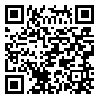Volume 12, Issue 3 (Autumn 2025)
DSME 2025, 12(3): 319-330 |
Back to browse issues page
Research code: 12714
Ethics code: R.IUMS.FMD.REC.1398.1197
Download citation:
BibTeX | RIS | EndNote | Medlars | ProCite | Reference Manager | RefWorks
Send citation to:



BibTeX | RIS | EndNote | Medlars | ProCite | Reference Manager | RefWorks
Send citation to:
Gassabichorsi M, Aalaa M, Ramazani G, Hosseinzadeh Z, Sohrabi Z. Assessing the Responsiveness of Educational-Treatment Centers Providing Services to Diabetic Patients in the Transition to Accountable Education: Patients’ Perspective. DSME 2025; 12 (3) :319-330
URL: http://dsme.hums.ac.ir/article-1-539-en.html
URL: http://dsme.hums.ac.ir/article-1-539-en.html
Center for Educational Research in Medical Sciences (CERMS), Department of Medical Education,School of Medicine, Iran University of Medical Sciences, Tehran, Iran.
Abstract: (1119 Views)
Introduction: This study evaluated the responsiveness of diabetes clinics and educational–treatment centers in Tehran under Iran’s responsive medical education framework. Responsiveness emphasizes enhancing healthcare quality aligned with societal needs. With type 2 diabetes prevalence rising and academic centers pivotal in service delivery, patient-perceived responsiveness is vital for quality improvement and socially accountable education.
Methods: A descriptive cross-sectional study targeted type 2 diabetes patients at clinics affiliated with Tehran Universities of Medical Sciences. Sample size was 330, calculated via standard formula. Data were collected through telephone interviews using a validated 28-item questionnaire assessing eight responsiveness dimensions on a five-point Likert scale (Cronbach’s alpha=0.95). SPSS version 16 facilitated descriptive statistics, one-sample t-tests, ANOVA, and Pearson correlation analyses.
Results: Overall responsiveness scored 3.01±0.45. Dignity (3.91±0.53), prompt attention (3.04±0.48), and environmental quality (3.58±0.51) exceeded the hypothetical mean. Autonomy and choice (2.71±0.39), clarity of communication (2.68±0.66), and social support (2.93±0.55) fell below. Significant differences emerged by gender (higher in men), marital status (higher in singles), and education level; no associations with diabetes duration or insurance status (P>0.05).
Discussion: Tehran’s educational–therapeutic clinics perform well in select non-medical responsiveness dimensions, but physician-centered models limit patient participation and psychosocial support. Gender-sensitive approaches, resident training in shared decision-making, and virtual support groups could enhance adherence and reduce diabetes-related economic burden.
Methods: A descriptive cross-sectional study targeted type 2 diabetes patients at clinics affiliated with Tehran Universities of Medical Sciences. Sample size was 330, calculated via standard formula. Data were collected through telephone interviews using a validated 28-item questionnaire assessing eight responsiveness dimensions on a five-point Likert scale (Cronbach’s alpha=0.95). SPSS version 16 facilitated descriptive statistics, one-sample t-tests, ANOVA, and Pearson correlation analyses.
Results: Overall responsiveness scored 3.01±0.45. Dignity (3.91±0.53), prompt attention (3.04±0.48), and environmental quality (3.58±0.51) exceeded the hypothetical mean. Autonomy and choice (2.71±0.39), clarity of communication (2.68±0.66), and social support (2.93±0.55) fell below. Significant differences emerged by gender (higher in men), marital status (higher in singles), and education level; no associations with diabetes duration or insurance status (P>0.05).
Discussion: Tehran’s educational–therapeutic clinics perform well in select non-medical responsiveness dimensions, but physician-centered models limit patient participation and psychosocial support. Gender-sensitive approaches, resident training in shared decision-making, and virtual support groups could enhance adherence and reduce diabetes-related economic burden.
Type of Study: Orginal |
Subject:
Special
Received: 2025/11/14 | Accepted: 2025/11/30 | Published: 2025/12/21
Received: 2025/11/14 | Accepted: 2025/11/30 | Published: 2025/12/21
Send email to the article author
| Rights and permissions | |
 |
This work is licensed under a Creative Commons Attribution-NonCommercial 4.0 International License. |









